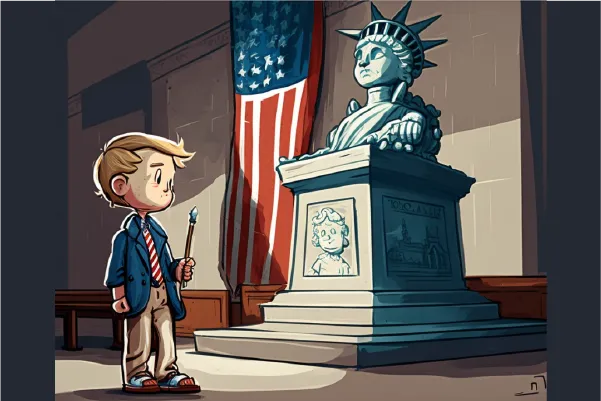
The educational crisis in America
In John Taylor Gatto's book "Weapons of Mass Instruction", he argues that the education system is designed 👉 to produce formulaic human beings whose behavior can be predicted and controlled.
Gatto begins the book by describing his own experiences as a public school teacher in New York City.
"The aim of public education is not to spread enlightenment at all; it is simply to reduce as many individuals as possible to the same safe level, to breed a standard citizenry, to put down dissent and originality."
Gatto believes that the education system 👉 is meant to stifle creativity and independent thought.
He suggests that the emphasis on conformity and standardized testing is designed to create a society of people who are all the same and who do not question authority.
But with the AI revolution rapidly changing the way we work and learn, 🤖 it's time to reconsider the purpose of education and consider alternative approaches that prioritize individual development and creativity.

Schools should be places of maximum freedom, not of authoritarianism...
❗Formulaic human beings whose behavior can be predicted and controlled. Really? In the world where creativity, problem-solving, and critical thinking are highly valued.
No to mention woke culture in schools and the suppression of freedom of speech.
The movement is becoming overly politicized and is silencing dissenting opinions.
Schools should be a place where students can explore and discuss different ideas and perspectives.
However, many students and teachers feel that they cannot express their opinions without fear of retribution.
This is not only detrimental to education, but it also 💯 goes against the principles of free speech and democracy.
Gatto argues that "schools should be places of maximum freedom, not of authoritarianism."
He suggests that we need to create a culture of open dialogue and encourage students to question authority and challenge the status quo.
This means creating a safe space for students 🔥 to express their opinions and fostering a culture of respectful debate.
Unfortunately, many schools are not currently fulfilling this goal.
In fact, some schools are actively suppressing free speech.

Have you ever wondered about the future of kids in an AI-driven world?
I mean, we hear all these buzzwords about artificial intelligence and machine learning, but what does that mean for the education of our children?
It seems like schools are struggling to keep up with the rapid pace of technological advancement.
They're still using outdated teaching methods and failing to prepare students for the new realities of the job market.
So, what can we do to ensure our kids are ready for the future?
Is there a way to incorporate more AI and technology into the classroom, or do we need a complete overhaul of the education system?
And what about the ethical concerns surrounding AI?
Should we be teaching kids about the potential dangers of AI, or is that too alarmist?
What do you think?
The AI revolution is rapidly changing the way we work and learn.
As AI becomes more prevalent, we will need to focus on skills that cannot be replicated by machines.
These skills include creativity, problem-solving, critical thinking, and emotional intelligence.
By focusing on these skills, we can ensure that our children are prepared for the future.
What can we do to address this crisis in education?
👉 Shifting the focus from memorization to problem-solving and critical thinking.
👉 Teaching students how to analyze information, think creatively, and work collaboratively with others.
👉 Incorporating more project-based learning and real-world scenarios into the curriculum, so that students can see the relevance of what they are learning.
👉 Introducing more AI-related subjects into the curriculum: courses on machine learning, programming, and data analysis, all of which will be essential skills in an AI-dominated world.
Entrepreneurship education could be a total game-changer for kids!
It's not just about learning how to run a business - it's about developing a whole set of skills that will come in handy no matter what they end up doing in life!
💥Think about it: by learning to develop new products and services, kids can flex their creative muscles and problem-solving skills.
And that's not all - they'll also pick up some seriously useful skills like project management, marketing, and financial management.
And let's be real here - those are skills that are useful for anyone, whether you're an entrepreneur or an employee in any industry.
So if we really want to set our kids up for success in the future, it's time to start thinking seriously about entrepreneurship education.

But what about the students themselves?
Do they have a role to play in their own education?
Gatto believes that they do.
He argues that the education system is meant to stifle creativity and independent thought, and that students need to take charge of their own learning in order to overcome this.
By questioning authority, challenging the status quo, and pursuing their own interests, students can break free from the constraints of the education system and become independent thinkers and problem solvers.
In John Taylor Gatto's book "Weapons of Mass Instruction", he argues that the real solution for this problem is going to have to come from below, not from above.
It's up to parents, educators, and entrepreneurs to take charge and create the education system that we want.
We need to move away from the traditional one-size-fits-all approach and prioritize individual development and creativity.
This means encouraging entrepreneurship, fostering a love of learning, and providing students with the tools they need to succeed in the modern world.

